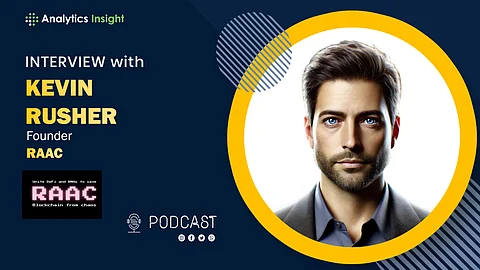

Real estate remains one of the largest and most traditional asset classes globally. But as digital finance continues to evolve, blockchain technology is reshaping how we buy, sell, and invest in property. In this compelling episode of the Analytics Insight Podcast, host Priya Dialani welcomes Kevin Rusher, Founder of Regnum Aurum Acquisition Corp., aka, RAAC, to discuss how tokenizing real estate assets is making investment more inclusive, transparent, and efficient.
The conversation dives deep into the power of blockchain, the flaws in current real estate systems, and how RAAC is creating a seamless bridge between traditional financial infrastructure and decentralized finance (DeFi).
Investing in real estate has long been a cornerstone of wealth-building—but it’s not without barriers. From credit checks and geographic restrictions to opaque processes and limited access, traditional systems often exclude everyday investors.
That’s where tokenization steps in.
Kevin Rusher explains: “Tokenizing real estate means converting property into digital tokens on a blockchain. These tokens can represent shares of a building or income from rental properties, making it easy to trade and invest—even across borders.”
By using smart contracts and blockchain’s transparent ledger, RAAC reduces the need for intermediaries and makes the entire process more secure and streamlined.
RAAC was founded with a clear goal: to bring real-world, revenue-generating assets—like real estate—into the world of decentralized finance. Instead of waiting for a hypothetical future, RAAC is building tools for what the market actually is today.
“RAAC is designed for people who want to borrow against the real value of their assets,” says Kevin. “We’re not replacing traditional finance—we’re making it more accessible.”
By allowing users to take loans against tokenized real estate, RAAC empowers individuals to tap into liquidity without selling their property. It’s a game-changing approach that creates new financial possibilities for property owners and investors alike.
The Promise and Challenges of Blockchain-Based Real Estate
While tokenization offers unprecedented benefits, it also brings responsibilities. Regulatory clarity, secure smart contract development, and financial education are crucial for ensuring safe adoption.
Kevin highlights the need for trust and real-world utility in the DeFi space: “We’re not building hype. We’re building for stability, transparency, and usability.”
Blockchain-based real estate is already unlocking new possibilities:
Broader access: Anyone with an internet connection can invest, regardless of credit or geography
Fractional ownership: Investors can buy a portion of a property instead of the whole thing
Increased liquidity: Tokenized assets can be traded more easily than traditional property
Transparent lending: Smart contracts automate and secure the borrowing process
As Kevin puts it, “This is not just about technology—it’s about democratizing one of the most valuable asset classes on earth.”
As blockchain adoption grows, real estate tokenization will likely become a standard part of how we build wealth and access credit. With innovators like RAAC leading the charge, the future of property investing is decentralized, digitized, and more inclusive than ever before.
“We’re building a bridge,” Kevin concludes, “not a replacement. Real estate isn’t going anywhere—but the way we invest in it is changing forever.”
